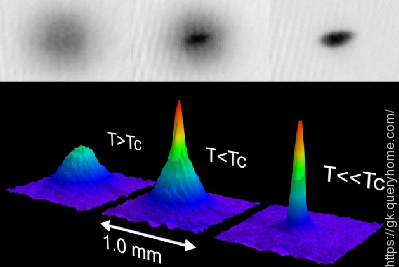All fundamental particles, such as electrons and photons, have an intrinsic degree of freedom called “spin”, which in many situations acts like a form of angular momentum.
A boson is a particle with a total spin that is equal to an integer (0,1,2,…) times the Planck constant (ℏℏ). For example, photons (the particles that compose light) are bosons having total spins of just ℏℏ. This is in constrast to electrons, which are fermions and have spins of ℏ/2ℏ/2. All fundamental force carrying particles (photon, gluon, W, Z) are bosons.
Bosons obey Bose-Einstein statistics, which means that any number of bosons of the same type can occupy the same physical state. This may seem of little practical consequence, but it implies that composite particles, including whole atoms, with integer spin numbers can condense into a special form of matter called a Bose-Einstein condensate.

